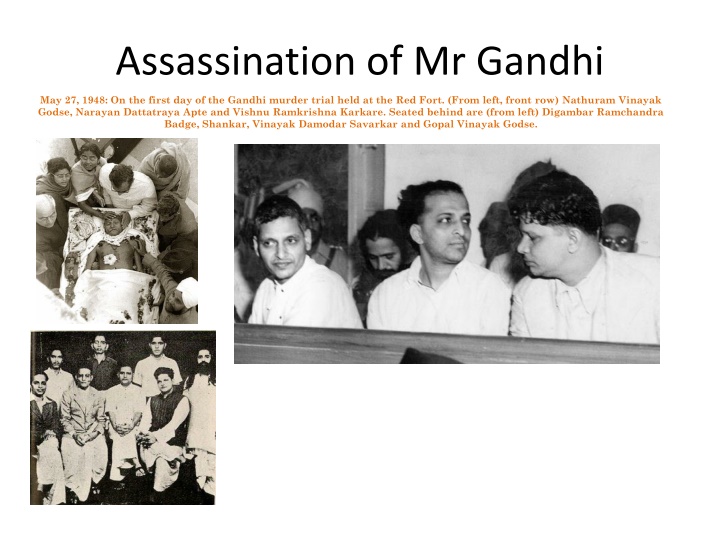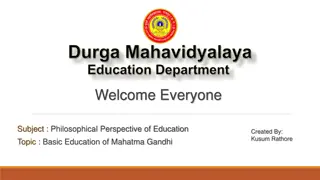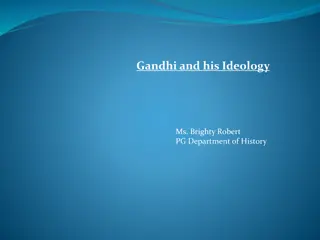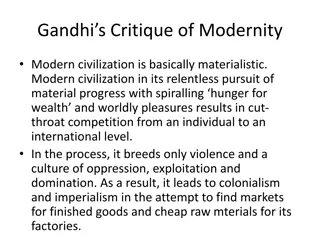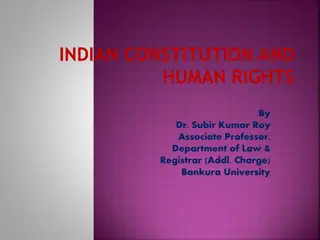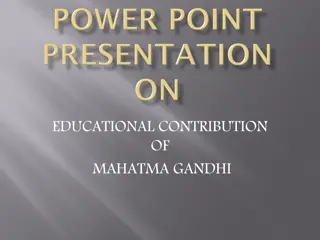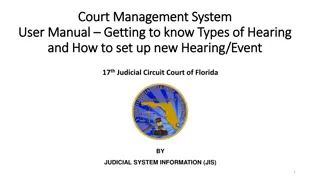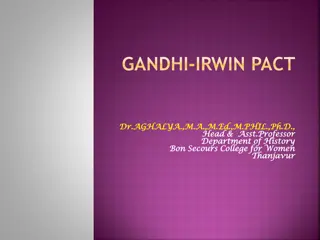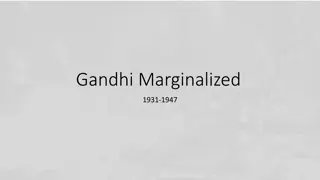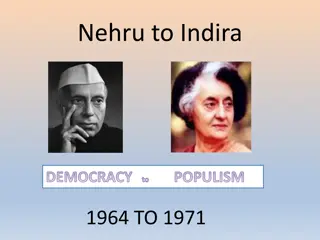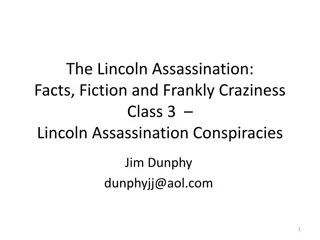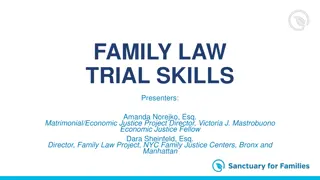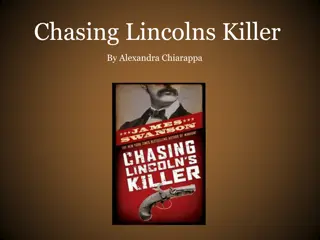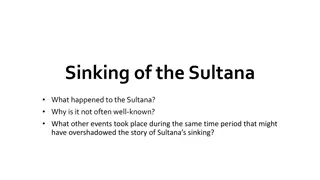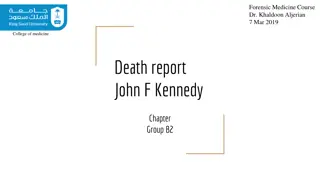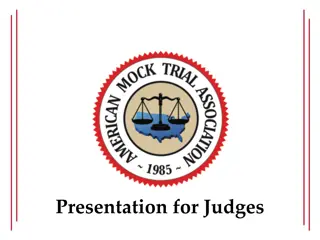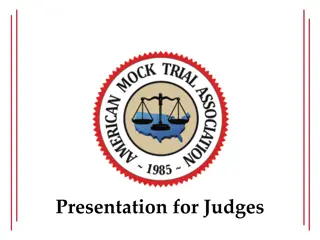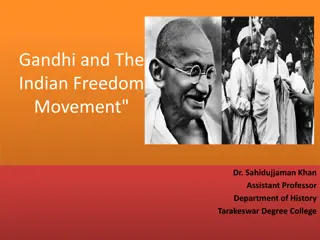The Assassination of Mahatma Gandhi and the Trial of the Conspirators
The assassination of Mahatma Gandhi on January 30, 1948, by a young Hindu extremist sent shockwaves through India. The trial of the accused conspirators, including Nathuram Godse and Narayan Apte, resulted in eight convictions, with Godse and Apte being hanged for the murder. The incident marked a tragic end to the life of the Father of the Nation and left the country in mourning and reflection on the legacy of Gandhi's teachings.
Download Presentation

Please find below an Image/Link to download the presentation.
The content on the website is provided AS IS for your information and personal use only. It may not be sold, licensed, or shared on other websites without obtaining consent from the author.If you encounter any issues during the download, it is possible that the publisher has removed the file from their server.
You are allowed to download the files provided on this website for personal or commercial use, subject to the condition that they are used lawfully. All files are the property of their respective owners.
The content on the website is provided AS IS for your information and personal use only. It may not be sold, licensed, or shared on other websites without obtaining consent from the author.
E N D
Presentation Transcript
Assassination of Mr Gandhi May 27, 1948: On the first day of the Gandhi murder trial held at the Red Fort. (From left, front row) Nathuram Vinayak Godse, Narayan Dattatraya Apte and Vishnu Ramkrishna Karkare. Seated behind are (from left) Digambar Ramchandra Badge, Shankar, Vinayak Damodar Savarkar and Gopal Vinayak Godse.
Mahatma Gandhi was assassinated by a young Hindu extremist while walking to his prayer meeting in the lawn of Birla House, New Delhi, 30-1-1948. He was 78 The man then whipped out a pistol from inside his pocket and fired three times at point-blank range. The bullets lodged in Gandhi's chest, stomach and groin. The man, who gave his name as Nathuram, fired a fourth shot, apparently in an effort to kill himself, but a Royal Indian Air Force sergeant (Tom Rein) standing alongside jolted his arm and wrenched the pistol away
The following were accused in what is known as the Mahatma Gandhi Murder Case: 1. Nathuram V. Godse 2. Narayan D. Apte 3 Vishnu R. Karkare 4. Madanlal K. Pahwa 5. Shankar Kistayya 6. Gopal V. Godse 7. Vinayak D. Savarkar 8. Dattatraya S. Parchure 9. Gangadhar S. Dandawate 10. Gangadhar Jadhav 11. Suryadeo Sharma Digambar R. Badge turned approver
Eight men were convicted in the murder trial inside Red Fort by a special court, constituted by an order of the central government. Godse and co-conspirator Narayan Apte were hanged for the murder of the Father of the Nation on November 15, 1949
Attempts to kill Gandhi It was remarked that the first of three attempts on Mr. Gandhi's life was made in Poona on June 25, 1934, when a bomb was thrown at a car believed to be Mr. Gandhi's. Poona is a center of the extremist anti-Gandhi orthodox Hindu Mahasabha. The second possible attempt to assassinate Mr. Gandhi was by means of a crude bomb planted on his garden wall on Jan. 20 1948.
Nehru delivered Mr. Gandhi's valedictory in his radio address late that evening. In a quivering voice he said: "Gandhi has gone out of our lives and there is darkness everywhere. The father of our nation is no more- no longer will we run to him for advice and solace. This is a terrible blow to millions and millions in this country. "Our light has gone out, but the light that shone in this country was no ordinary light. For a thousand years that light will be seen in this country and the world will see it... Oh, that this has happened to us! There was so much more to do. Referring to the assassin Pandit Nehru said: "I can only call him a madman. He pleaded for a renewed spirit of peace, which had been Mr. Gandhi's last project, saying: "His spirit looks upon us- nothing would displease him more than to see us indulge in violence. All our petty conflicts and difficulties must be ended in the face of this great disaster...In his death he has reminded us of the big things in life."
Gopal Godse, in his book Gandhiji's Murder And After. Nathuram says "the reason is purely political and political alone!" He asks for time to explain his case but the police do not allow this. In court, Nathuram explained himself in a statement, but the court banned it. Gopal Godse reprints Nathuran's will in an annexure to his book. The last line reads: "If and when the government lifts the ban on my statement made in the court, I authorise you to publish it."
I do say that my shots were fired at the person whose policy and action had brought rack and ruin and destruction to millions of Hindus, I bear no ill will towards anyone individually, but I do say that I had no respect for the present government owing to their policy, which was unfairly favourable towards the Muslims. But at the same time I could clearly see that the policy was entirely due to the presence of Gandhi.
In the essay, A.G. Noorani cited letters written by then home minister Vallabhbhai Patel, who wrote to Prime Minister Jawaharlal Nehru in 1948 that it was a fanatical wing of the Hindu Mahasabha directly under Savarkar that "(hatched) the conspiracy and saw it through
Kapur Commission The release of the conspirators in the Gandhi murder case in 1964 and the resultant celebrations in Pune and Ketkar's remarks that he was aware of Nathuram Godse's desire to kill Gandhi, led to a public outrage and resulted in the forming of the Pathak commission, when Pathak became central minister and then governor of Mysore state, the Kapur commission was set up in 1966 as the commission of inquiry into the conspiracy to murder Mohandas Karamchand Gandhi.
It was a one man commission formed of Justice Jivanlal Kapur of the Supreme Court. It took three years to complete its work. It strongly indicted those responsible for Gandhi's security with negligence. It was provided with evidence not produced in the court; especially the testimony of two of Savarkar's close aides - Appa Ramachandra Kasar, his bodyguard, and Gajanan Vishnu Damle, his secretary. It exonerated Savarkar for want of corroborative evidence to support the approver's testimony, however with the remark that the facts on the whole demolished any other theroy but the conspiracy of Savarkar and his group in the murder of Gandhi.
